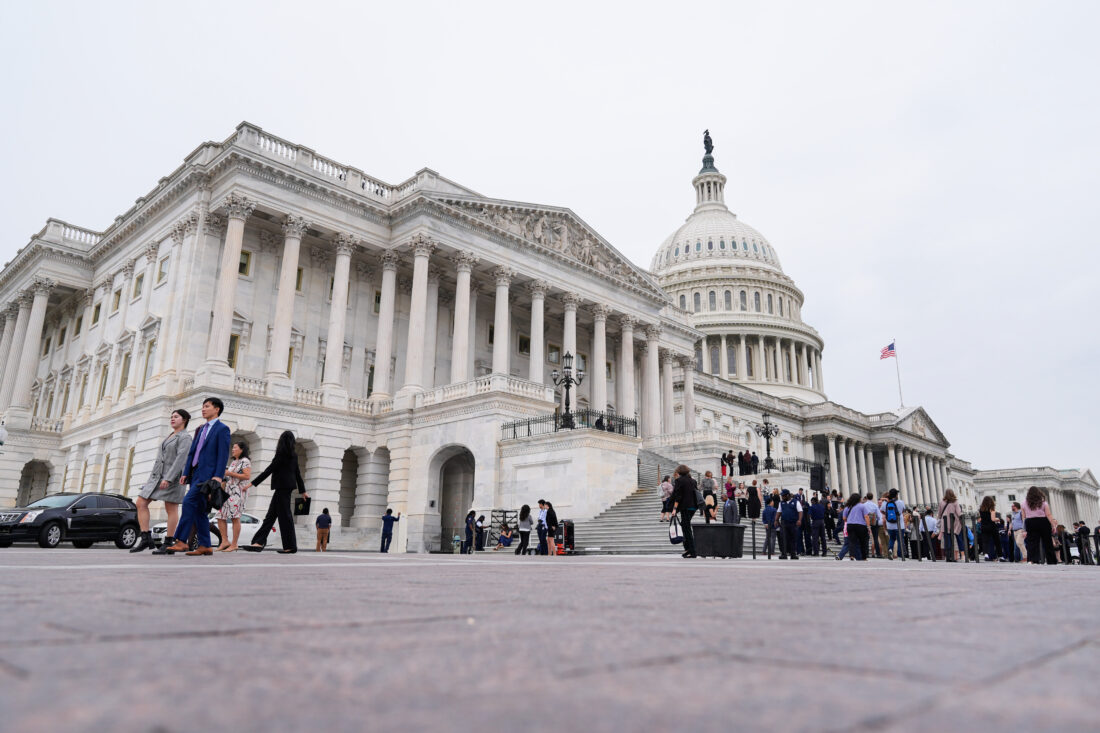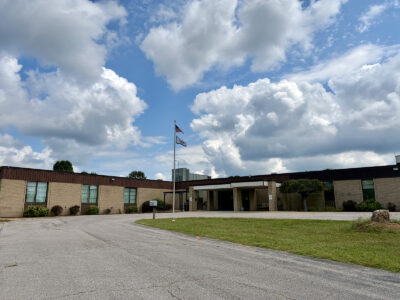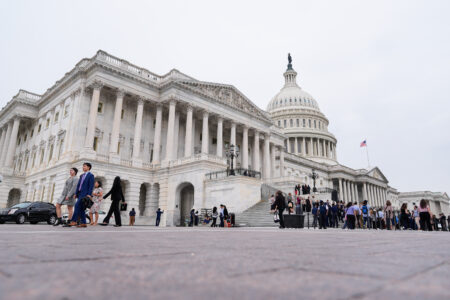Senate Republicans, Democrats fail to reach deal on CR to fund federal government
Non-essential services begin shutting down Wednesday

The U.S. Capitol is photographed after a news conference, Tuesday, Sept. 30, 2025, at the Capitol in Washington. (AP Photo/Mariam Zuhaib)
CHARLESTON — With no short-term deal in place to keep the federal government funded over the next several weeks, non-essential services will begin to shut down Wednesday, affecting thousands of federal employees in West Virginia.
In two votes Tuesday night, the U.S. Senate could not reach the 60-vote threshold needed to move forward on either the U.S. House of Representative’s Continuing Appropriations and Extensions Act, a clean continuing resolution passed two weeks ago; or a continuing resolution sponsored by the Senate Democratic minority that included an extension of Affordable Care Act subsidies that were set to expire at the end of the year.
U.S. Sens. Shelley Moore Capito and Jim Justice, both R-W.Va., voted in favor of a motion to reconsider an earlier vote on the House resolution, which would have kept the federal government funded through Black Friday, Nov. 21, with no new funding requests or budget cuts. The motion failed in a 55-45 vote.
Both Capito and Justice voted against a motion to reconsider an earlier vote on the Senate Democrats’ resolution, which failed 47-53.
“Tonight, I proudly case my vote again to do right by West Virginians – to keep the government open and ensure the critical services that many rely on can continue to operate,” said Capito. “Shutdowns are unnecessary and costly, especially to small businesses and federal employees in West Virginia and across the country.
“Sadly, Senate Democrats chose to play politics instead of working with us to get the 60 votes needed in the Senate to prevent a government shutdown,” Capito continued. “The American people will unfortunately now bear the consequences. I call on my Democratic colleagues to set aside partisanship and join Republicans in keeping the government open.”
“This shouldn’t be a food fight,” said Justice. “Senate Republicans put forward a clean bill to keep the government open: a bill similar to what Democrats have voted for 13 times in the past. Democrats now have a choice: work with us or explain the fallout to working Americans.
“In West Virginia, we have always done what’s right: we mind the store, put our people first, and use common sense to make decisions,” Justice continued. “Democrats ought to wake up and work with us, because a closed government, this doesn’t benefit anybody.”
Following the failed vote on the Senate Democrats’ resolution, Senate Minority Leader Chuck Schumer, D-N.Y., said the Continuing Appropriations and Extensions Bill was needed to keep health care premiums from increasing on those receiving health insurance through the Affordable Care Act marketplace.
“The (House) CR was the wrong option for America a week ago. It remains the wrong option today, because it does nothing, absolutely nothing, to solve the biggest health care crisis in America,” Schumer said. “As we speak, tens of millions of Americans are getting letters in the mail informing them that their health care premiums are about to shoot up by an average of 114%.”
“It’s natural that people understand that (President) Donald Trump and the Republicans want a shutdown and Democrats do not,” Schumer continued. “We need to deal with this health care crisis now, not later. But the Republican bill fails to do that.”
The short-term measures were meant to keep the federal government funded at current levels through the start of the new federal fiscal year which began at midnight as lawmakers continue work on larger appropriations bills for fiscal year 2026.
With both continuing resolutions failing to reach the required 60 votes in order to be considered by the full Senate, non-essential federal services will begin to furlough workers and shut down.
Federal services that won’t be interrupted include the U.S. Postal Service which is primarily self-funded and not reliant on federal appropriations. While Social Security checks and VA benefits will not be paused, application processing and other services could be. Health care through Medicare and Medicaid would continue. Other benefits reliant on federal funding, such as SNAP (Supplemental Nutrition Assistance Program) and the Women, Infants, and Children Supplemental Nutrition Program could be affected.
Federal agencies all have their own plans for shutdowns, determining what services continue or go on pause. Previous shutdowns have sometimes seen national parks and monuments close, but a shutdown during Trump’s first time saw parks and monuments remain open. But even with essential services – such as air traffic control, military and law enforcement – continuing, those federal employees would have to keep working without pay, though back pay would be provided once the shutdown is resolved.
According to the information compiled by the Federal Reserve Bank of St. Louis, federal civilian employment in West Virginia was 25,900 as of August, peaking at 26,700 federal employees at the end of November 2024 prior to Trump taking office for the second term in January. Since then, the Trump administration began to reduce the size of the federal workforce.
West Virginia is also home to more than 30 federal facilities, including the National Energy Technology Laboratory and National Institute for Occupational Safety and Health in Morgantown, the FBI’s Criminal Justice Information Services office in Clarksburg, NASA’s Katherine Johnson IV and I Facility in Fairmont, the Bureau of the Fiscal Service in Parkersburg, IRS facilities in Beckley and Kearneysville, and Veterans Affairs facilities in Huntington, Clarksburg and Martinsburg.
According to the left-of-center West Virginia Center for Budget and Policy, there have been at least 400 federal jobs lost due to workers being laid off since January in the state, not counting federal employees placed on administrative leave or those who accepted voluntary buyouts. Those cuts resulted in the loss of $31 million in federal dollars based on an average federal salary/benefits of $75,000 per year.
“In West Virginia, the agencies most impacted have been the Bureau of the Fiscal Service in Parkersburg, NIOSH in Morgantown, the Job Corps Center in Charleston, and National Park Service staff in the Monongahela National Forest and the New River Gorge National Park,” according to a recent report. “In many cases, the specific job losses are unclear, including at NIOSH, where lawsuits and other actions have brought back some NIOSH employees, but it is unclear how many or for how long.”
(Adams can be contacted at sadams@newsandsentinel.com)



